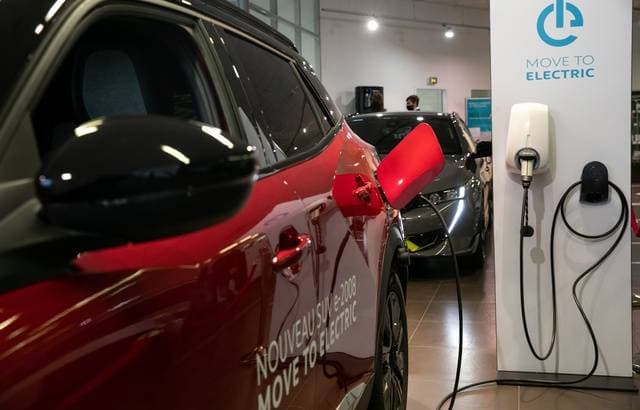Are Electric Cars Cheaper than Petrol or Diesel Vehicles? Coming Soon

AUTO: A study published on Monday shows that electric vehicles could become more affordable within a few years
- According to a BloombergNEF study, the price of electric vehicles – excluding state subsidies – will reach that of gasoline and diesel vehicles in six to seven years.
- This price parity is linked to the reduction in the cost of batteries and the reorganization of production chains.
- To accelerate this virtuous circle, some argue for financial incentives, others for tougher CO2 emission standards.
Within a few years, the price of new electric cars should no longer be a brake on purchasing. According to a BloombergNEF study published on Monday and carried out for the NGO Transport and Environment (T & E), they will gradually become less expensive than “thermal” cars (with gasoline or diesel engines) between 2025 and 2027, depending on the model.
Currently, for an identical vehicle, the electric is up to 30% more expensive to purchase. So why is the price going to drop? According to Bloomberg, the main gain will come from batteries, the cost of which has been falling steadily since 2010. A trend that should continue in the coming years. In 2024, thanks to technological developments, a battery could cost 30% less than today.
Concretely, for a Renault Zoé (one of the best-selling electric cars), this would represent a saving of around 2,300 euros per car produced. “This is a rather optimistic scenario since it provides for a continuous decline in the price of batteries, nuance Joseph Beretta, an expert in the field of electric mobility. However, temporary shortages of certain components cannot be ruled out in the coming years, which would slow down this drop in costs ”.
Horizon 2026
“Inexpensive” electric cars also require a change in automobile factories. Currently, they are often assembled from a base designed for thermal vehicles, which is therefore not optimal (for example to install batteries). According to Bloomberg, manufacturers, driven by the development of antipollution standards and declining battery prices, will favour platforms ( the “skeleton” of the vehicle ) designed specifically for electric power, which will reduce their production costs. .
Many countries have in fact planned to ban the sale of new cars equipped with combustion engines in the coming years: 2025 for Norway, 2030 for Denmark and the Netherlands, and 2040 for France, for example. To this could be added even more restrictive environmental standards, and penalizing tax measures for highly polluting cars. All this should encourage manufacturers to turn massively to electric.
These various economic gains, accompanied by political choices, should allow electric cars to be cheaper and more attractive than their petrol or diesel counterparts, by removing the incentives put in place by the State from the equation. According to Bloomberg, in category C (compact sedans such as Peugeot 308, Renault Mégane or Golf), electric will have the same price as thermal in 2026 (see graph below), then will become cheaper afterwards. For category B city cars (Clio, Citroën C3, Peugeot 208), the tipping point will be reached in 2027.
“Good news for the climate”, but…
This movement will have an effect on consumers. The study forecasts rapid growth in purchases of 100% electric cars (excluding hybrids): in Western Europe (France, Germany, United Kingdom), their market share should triple by 2025, from 5 to 15% of the total of new cars sold. In 2030, Bloomberg even estimates that out of ten new vehicles purchased, seven will be electric models.
“This is good news for the climate,” said Diane Strauss, director of T & E in France, in a statement. An electric car emits four times less CO2 than its thermal counterpart, even counting the manufacture of the battery ”. Asked by 20 Minutes , she specifies: “the movement towards the end of the thermal has started. The question now turns to the speed of this transition. For us, anti-pollution standards need to be tightened now, in order to encourage manufacturers to massify electric production, which will lower prices. Without this, there could be stagnation in sales for a few years, before the final ban on gasoline and diesel cars ”.
Find a terminal without making twenty terminals
For his part, Arnaud Aymé, transport specialist at Sia Partners, raises another fundamental problem. “Even if the majority of journeys are made over short distances, the driver will have to be reassured that he will be able to use his electric vehicle to go on vacation. This requires the massive development of a network of charging stations throughout the territory ”.
However, according to the specialist, the current ambition of the government, which targets 100,000 terminals at the end of 2021 , requires strong action. “The problem with terminals on public roads is that there are not enough of them and that currently, it is not necessarily profitable,” he continues. To amortize the cost of installation, it must be used often. Today, some see only two cars a day. So for investors to build massively, the State would have to guarantee them a minimum income at the start, then reduce this aid as and when electric vehicles are deployed ”. You are now aware of the challenges of the sector for the coming years.
Enjoyed this? Get the week’s top France stories
One email every Sunday. Unsubscribe anytime.


